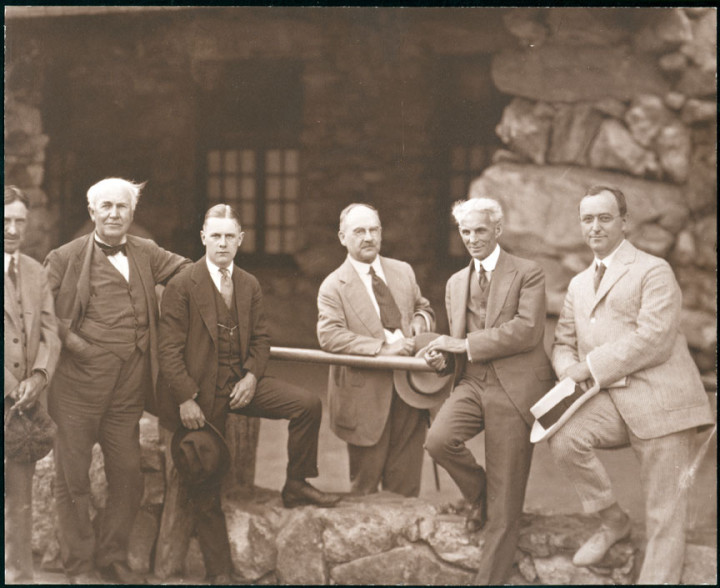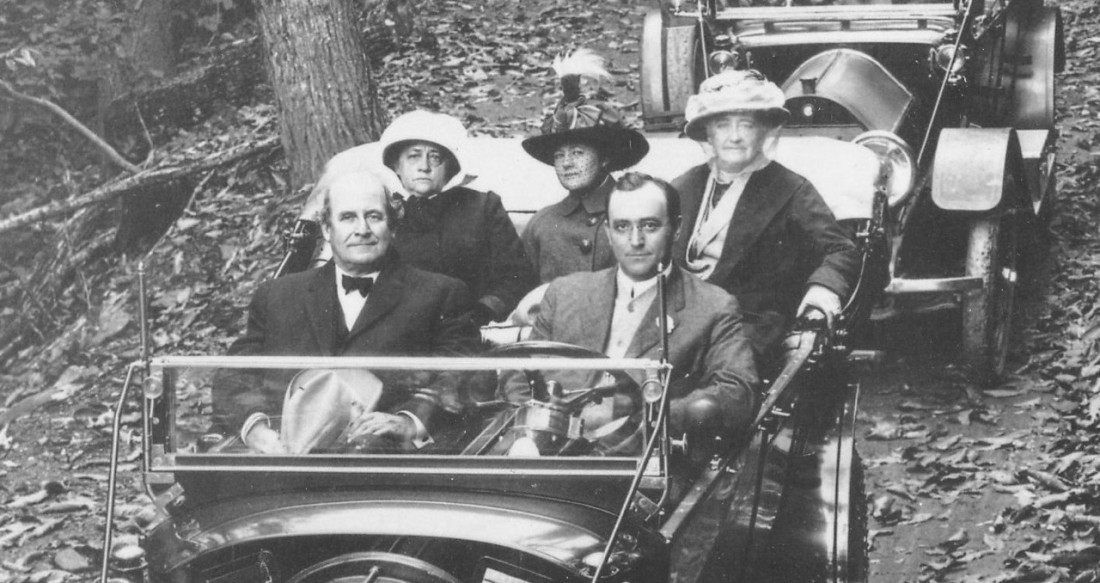Over the last 30 years, local historian and writer Bruce Johnson has been researching and writing about the Grove Park Inn. Within this time period, he’s published three history books — Built for the Ages: A History of the Grove Park Inn, Tales of the Grove Park Inn and The Arts & Crafts Furniture of the Grove Park Inn.
On Wednesday, June 28, Johnson will offer a talk at the Brown Bag Lunch Series, sponsored by The Friends of the North Carolina Room. The hour-long discussion, titled “Family Feud: The Bitter Battle Between E.W. Grove and Fred Seely for the Grove Park Inn,” will begin at noon in the Lord Auditorium, on the lower level of Pack Memorial Library.
Johnson spoke with Xpress about the upcoming event.
Xpress: What initially drew you to researching the Grove Park Inn?
Johnson: I was always interested in the arts and crafts movement [decorative and fine arts movement that began around 1880 in Britain before making its way to North America]. When I lived in Iowa City, I heard of the Grove Park Inn because it was built in 1913 and furnished in the arts and crafts style. So as soon as I moved to North Carolina [in 1986], I went to the Grove Park Inn and just literally fell in love with it, if you can fall in love with a building.

What will the focus of your upcoming talk be?
This is about a love triangle. The love triangle involved E.W. Grove [owner and founder of the Grove Park Inn], his only daughter Evelyn Grove [and her husband] Fred Seely. At the beginning, it was, or would appear to be, a perfect relationship. … In 1909 E.W. Grove is approached by the city of Asheville encouraging him to build a modern hotel. Asheville at that time had a lot of old wooden boarding houses, but the Old Battery Park Hotel, which has since been torn down, was really showing its age and they needed a new hotel. … Grove provided the money and Fred Seely provided all the design and the furnishings. And then when it opened in 1913, Fred Seely managed it for his father-in-law. But there was a problem: There was a jealousy issue … [which led to] a very bitter ending.
How did you go about researching the topic?
There are tremendous letters. E.W. Grove was hard of hearing. So he couldn’t talk over the telephone. And so, he wrote long, long letters to Evelyn and to Fred. We have tremendous … letters in the Grove and Seely families’ [collections] that detail all this.
What do you hope people take away from your talk?
One of my guiding philosophies as a historian … is to show that these were human beings. They had weaknesses. They had strengths. They’re not figures that we think of as marble statues. They were real people. And they had emotions like jealousy and pride. … They had some serious hurdles to overcome. I think the more we see historic figures as human beings, the more we can appreciate what they were able to accomplish.
WHAT: “Family Feud: The Bitter Battle Between E.W. Grove and Fred Seely for the Grove Park Inn”
WHERE: Pack Memorial Library, Lord Auditorium, lower level, 67 Haywood St.
WHEN: Noon-1 p.m. Wednesday, June 28. Free



The caption of the top photo should say William Jennings Bryan (not Bryant). Bryan was an interesting fellow who ran for president 3 times as a democrat. He was also co-council for the prosecution in the famous Scopes (monkey/evolution) trial in which Scopes was prosecuted for teaching Darwinian evolution.
Bryan was also an important player in a monetary policy debate that is crucial to the economy but almost nobody understands well
From the 1860’s to 1933 the US government paper money included “gold certificates” which were redeemable from the government in actual GOLD at a fixed exchange rate. The FDR admin made POSSESSION of gold certs ILLEGAL (after a window of time to turn them in).
Silver certificates (which could also be redeemed for real silver) continued to be issued until the LBJ admin in 1964 terminated them and introduced the Federal Reserve Note —- which is backed by NOTHING. And the Fed is allowed to print unlimited amounts of money leading to the massive inflation we have seen since the 60s.
Thanks for bringing this to our attention Mike. And thanks for the background on Bryan.
I enjoy your history articles and feel like I’m so old I’ve experienced some of them :-(
” introduced the Federal Reserve Note —- which is backed by NOTHING. And the Fed is allowed to print unlimited amounts of money leading to the massive inflation we have seen since the 60s.”
Yes, Mike…..far too many do not understand this. Nor do they realize that the U.S. Federal Reserve is privately owned and has been since it’s founding in 1913. Several of the owners are European families.
The Federal Reserve itself is not privately owned. It is run by a board which is nominated by the President and confirmed by Congress. They decide policy.
The Federal Reserve Banks which are part of the system are privately owned non-profit banks. All excess funds at these banks, after paying expenses, ensuring proper reserve levels etc, are transferred back to the US Treasury.